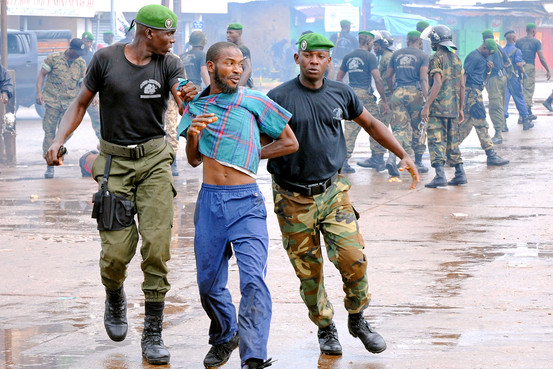
Wall Street Journal
September 29, 2009

Conakry, Guinea — Government security forces fired at a crowd gathered on Monday to protest the leader of a coup in the West African nation, killing at least 58 people, a human-rights group said, deepening the political crisis in the world's top exporter of bauxite, the raw material used to make aluminum.
The violence comes after months of uncertainty since Capt. Moussa Dadis Camara seized power in a December 2008 coup after longtime dictator Lansana Conte died. Capt. Camara has said that he has the right to contest presidential elections scheduled for Jan. 31. While he hasn't yet made an official announcement, he told diplomats that he will run. Capt. Camara initially had pledged that he wouldn't run for office.
Opposition parties organized the protest, which drew some 50,000 people in Conakry, the capital. The protesters had gathered in defiance of a government ban on the event, then broke into the stadium to hold their rally.
Then, soldiers in red berets from the presidential guard entered and fired on the crowd. Several people were killed, and some opposition leaders were arrested, witnesses said. “At one hospital alone, we have counted 58 bodies,” Thierno Maadjou Sow, president of the Guinean Human Rights Organization, told Reuters. “It seems there are many more corpses” in another hospital.
The ruling junta, known as the National Council for Democracy and Development, said it wouldn't negotiate. “Those who want to defy the authority of the state, we will stop them,” said Commandant Moussa Diegboro Camara on local radio.
The protest is yet another example of African civil society groups pushing oppressive governments, though not always successfully, for reform.
Guineans initially welcomed the coup, desperate for change after decades of rule under Mr. Conte, who pillaged the country and left his people impoverished. But Capt. Camara quickly tightened his grip on power, stifling dissent and harassing mining companies that offer a crucial revenue stream for the country.
Since the coup, the international community has cut off aid to Guinea. The African Union froze Guinea's membership in the regional body and has said that it would impose sanctions on the government. So far, mining firms such as UC Rusal and Rio Tinto haven't indicated that the instability would force them to leave.
Contact : info@webguine.site
webGuinée, Camp Boiro Memorial, webAfriqa © 1997-2013 Afriq Access & Tierno S. Bah. All rights reserved.